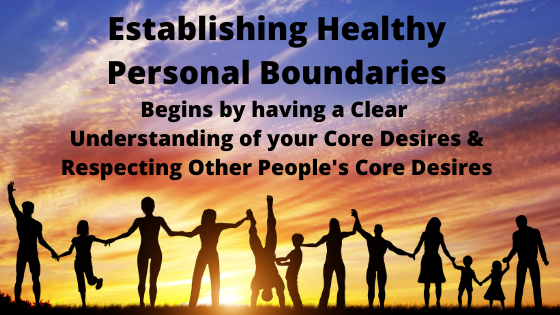Learn 7 Keys for Setting Personal Boundaries

My Commitment and Dedication: I am dedicated to providing evidence-based guidance and support to help you build a strong foundation for a life of optimal health, happiness, vitality, and quality. About My Blog and Membership Programs: My blogs and articles focus on these principles, offering in-depth insights through... more
Establishing healthy relationships is an important part of life for your health and well-being. Setting boundaries for better health and is instrumental in building healthy relationships. Whether this is friendships, lifelong partners, work colleagues, and acquaintances. So, let us look at 7 key steps to setting healthy boundaries that will help you enjoy positive, happy, and healthy personal relationships.
1: A clear understanding of your emotional limits — There aren’t too many people that don’t come into adult life with some issues from their childhood experiences. As you move into relationships in your adult life some of these experiences may arise unknowingly and unwillingly. They may even bring up post traumatic feelings causing anxiety, depression and panic. Learning to understand, working through these past events, experiences will help with building boundaries to support you with bringing balance to your emotional health.
2: Understand your physical limits — It is important to push yourself and to learn just what you can achieve. Oh my gosh if you never did that, you could remain stuck never to know your full potential. It is necessary to know when to say NO! When to take time to yourself! This will also benefit your emotional well-being because when you become over tired or over-stressed, your emotions can go into overdrive where everything appears to be worse than it really is.
3: Tune into your feelings — The way you feel will come from your thoughts, your thoughts come from your subconscious, bringing up past experiences, often making the way you feel unbearable and intolerable. Not to really understand why. To bring these thoughts to your conscious mind to recognize where they are coming from and to get a clear understanding as to whether it has any relevance to your present experience will allow you to take control and let the feeling go, if it interferes with your present moment. Feelings of anger often come about because deep down, the other person or experience isn’t behaving, being or going in the way you would like.
4: Deep feelings of discomfort — Learning to recognize and understand your feelings is of major importance. As mentioned there will be feelings that need to be let go as they may not be relevant to what is happening in the now or be rationale. However, you do have an inbuilt self-protective mechanism that if you have a feeling of deep discomfort from a person, activity or event, then take notice as this could be a cue that your boundaries are being violated.
5: Understand your core desires — Your core desires are your life map of how you want to be, how you want to be treated, what you want to contribute to life and how you want your life to be. These don’t have to be complicated or unrealistic but necessary to give you a foundation for developing your boundaries.
6: Take care of yourself — Always to remember when you take care of you and don’t engage in negative habits. You will be in a better position to be there and contribute positively with your relationships such as being a friend, a mother, father, employee, employer, daughter and son. Recognizing the importance of your feelings to honour them, let go of feelings that don’t serve you well and embrace feelings that protect, enhance and enable you to move into a happier, more positive place.
7: Be direct — Often when you begin to verbalise your boundaries, others will challenge you. It is important to make a clear statement to your actual decision. Each person is different and this is where mutual respect comes into play. An example of this maybe the fact that you don’t drink alcohol, you are invited to a work event, where people are wanting you to engage in drinking alcohol. All you have to say is that you don’t drink, no explanation needed. The same can be said for anything else that you want to refrain or not engage in. In these scenarios you may actually feel the need to go home.
An excerpt from my course Building a Brilliant Mind is the foundation for building a lifetime of optimal health, happiness, vitality, and success.









